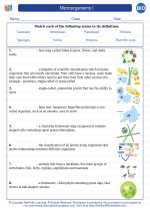Titanium: Properties, Uses, and Importance
Titanium is a chemical element with the symbol Ti and atomic number 22. It is a lustrous transition metal with a silver color, low density, and high strength. Here are some important aspects of titanium to consider:
Properties of Titanium:
- Atomic number: 22
- Symbol: Ti
- Atomic weight: 47.867
- Physical state at room temperature: Solid
- Color: Silver-grey
- High melting point: 1,668°C (3,034°F)
- Low density: 4.506 g/cm3
- High strength: Especially when alloyed with other metals
- Resistance to corrosion: Exhibits excellent corrosion resistance
Uses of Titanium:
Titanium is widely used in various industries due to its unique combination of properties. Some common uses include:
- Aerospace Industry: Titanium is used in aircraft components, including airframes, engines, and landing gear due to its high strength-to-weight ratio.
- Medical Applications: Titanium is biocompatible and is used in medical implants such as joint replacements, dental implants, and surgical instruments.
- Chemical Processing: Due to its corrosion resistance, titanium is used in the chemical industry for reactors, pipes, and heat exchangers.
- Sports Equipment: Titanium alloys are used in the production of high-performance sports equipment such as bicycle frames, golf clubs, and tennis rackets.
- Architecture and Marine Applications: Titanium's resistance to corrosion makes it suitable for architectural structures and marine components.
Importance of Titanium:
The unique properties of titanium make it a crucial material in various industries, contributing to advancements in aerospace technology, medical treatments, and industrial processes. Understanding the properties and uses of titanium is essential for engineers, material scientists, and professionals working in fields that rely on this versatile metal.
Study Guide
To effectively study titanium, consider the following key points:
- Learn the basic properties of titanium, including its atomic number, symbol, atomic weight, and physical characteristics.
- Understand the importance of titanium in different industries and its specific applications in aerospace, medical, chemical, sports, architecture, and marine sectors.
- Explore the reasons behind titanium's suitability for various applications, such as its high strength-to-weight ratio and corrosion resistance.
- Examine the role of titanium in advancing technology and contributing to scientific and industrial progress.
- Consider the environmental and economic impact of titanium production and its sustainable use in different fields.
By grasping these fundamental aspects, you can develop a comprehensive understanding of titanium and its significance in the modern world.
[Titanium] Related Worksheets and Study Guides:
.◂Biology Worksheets and Study Guides High School. Microorganisms I
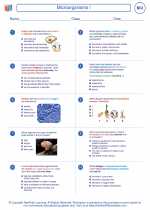
 Worksheet/Answer key
Worksheet/Answer key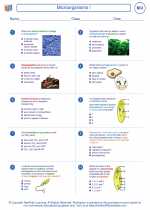
 Worksheet/Answer key
Worksheet/Answer key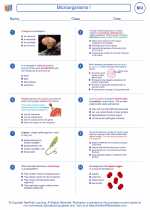
 Worksheet/Answer key
Worksheet/Answer key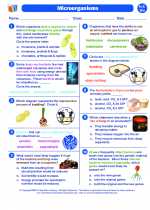
 Vocabulary/Answer key
Vocabulary/Answer key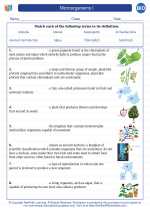
 Vocabulary/Answer key
Vocabulary/Answer key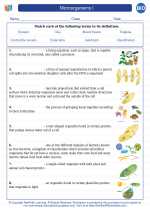
 Vocabulary/Answer key
Vocabulary/Answer key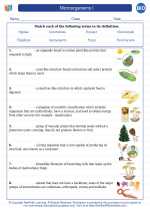
 Vocabulary/Answer key
Vocabulary/Answer key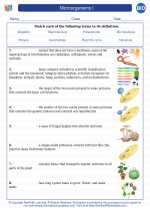
 Vocabulary/Answer key
Vocabulary/Answer key